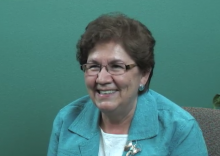
Born: El Paso, Texas
From her beginnings as a girl who only spoke Spanish in east El Paso, Texas to becoming one of the most influential members of the Las Hermanas organization, Sister Yolanda Tarango is a proud Chicana feminist. She is the oldest of 7 children and started school in an “Anglo” Catholic school where she learned to speak English, but also experienced her first wave of institutionalized racism. However, as she changed schools in her fourth-grade year due to the unfair gerrymandering that racially separated her Latina community from the church, her family moved her and her siblings to the “Mexican” church school. It was here that she really excelled because of her knowledge of English from her previous schooling experience. She graduated from there to go to a Catholic high school, and just after graduating high school, she joined the convent in 1966 and is still a nun today.
1966 was an important time for Catholicism because it marked the ending of the second meeting of the Vatican and many traditions were changed and let go. She appreciates how she was able to experience this change, even though staying with the convent is not what she had originally planned to do. She remembers telling her parents to come get her after a semester because it was only an experiment before going to college. She decided to stay and then attended college while she was in the convent. While she had a difficult time adjusting to her life at the convent, including being away from family and accepting another name, she made the effort to stay in touch with the Chicana movement. She recalls saving newspaper clippings so she could stay up to date, and would hide them for fear of being caught because at the time, convent women in her same status were supposed to let go of their past.
It was through her experiences in the convent, and her interactions with other Sisters, that she really awakened to the depths of institutionalized racism. She carried these experiences with her as she traveled to Dallas, Texas for her new job working at a center for children with mental health conditions. While there, she was part of the founding of Las Hermanas, which was an organization that was initially established to bring Latinas in the convent together to advocate for their people. The organization sent letters to all the Spanish-speaking Sisters calling them to an organizing meeting in 1971. This was very important to Sister Yolanda Tarango because she discovered that she was not the only one struggling to bring together her identity as a religious Sister and as a Latina. In this group, she was not a minority and there was a lot of support and power with this group of women. She is still a part of this organization, and she describes how the structure of Las Hermanas is one that is ever-changing and has survived because it has the ability to adapt and reform. She maintains that Las Hermanas’ organizational model called for Sisters to be in the trenches with the people who needed their support. This kept their focus on promoting justice for those who had no voice.
Las Hermanas underwent a great deal of change from its beginnings throughout the 1970s, and the organization faced structural issues as well. As Sister Yolanda points out, there were obstacles with families, husbands, and even the Church, as women were breaking out of these traditional roles and advocating for a more equitable experience here in the U.S. She recalls the importance of the organization’s shift from a more myopic woman-in-the-Church based focus, to an adoption of the whole feminist agenda. This broadening empowered more women to join the organization, and it also, in the eyes of Sister Yolanda, allowed Las Hermanas to bring the church to communities that were not being served adequately by the Catholic church. After the shift to a broader agenda, Las Hermanas began to work with other groups. The organization participated directly with the farmworkers movement, and on an individual and local basis, participated in the Chicana movement as well.
Sister Yolanda’s journey as a nun and with Las Hermanas took her various places where she had a role in helping transform the role of women in the church and the Mexican American community. She earned a Master of Divinity Degree and a Doctor of Ministry Degree. She co-authored a book (Hispanic Women: Prophetic Voice in the Church) and published several articles that aim to redefine the roles of women in the church and in society. She states that even though she believes that women could be priests, she felt her calling was to help people, especially women. In 1985, Sister Yolanda and another Sister opened a home for homeless women and their children. She is still living at this home and working with women and children experiencing homelessness. Growing up she recalls her mom’s activism for women, and how that really politicized her and sent her on her journey to become the strong Chicana feminist she is today. She is still active and is considered a role model for many Chicana women, especially to those who are part of the Catholic Church. She believes that women, like men, should be able to have leadership roles in the Church in their everyday lives.
For more information on Sister Yolanda Tarango and Las Hermanas, see Band of Sisters, the film: http://www.bandofsistersmovie.com/sisters/yolanda-tarango and Las Hermanas: Chicana/Latina Religious-Political Activism in the U.S. Catholic Church, by Lara Medina.
